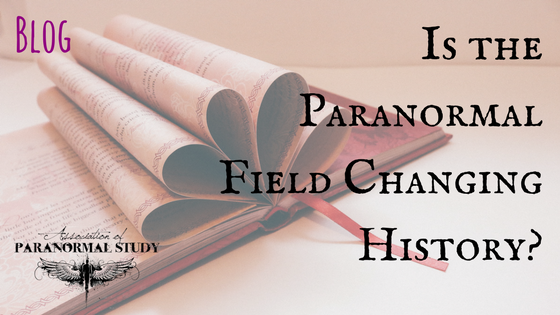A few weeks ago, I had the opportunity to sit down with a historian and talk history. What else would we talk about, right? Besides friendly banter, I am always up to talk to an expert in their field. Sure, we do a decent job with the historical research and keeping up with the facts. We have even debunked legends of a few locations. But in this case, I’m talking about someone who has a degree in history, works tirelessly for historical preservation, member of numerous historical societies, etc. Our conversation was brief, but it was very enlightening. I asked the historian what his thoughts were on the paranormal and how it affects the locals of whichever town he’s in. He expressed to me that he was [understandably] a skeptic, but paranormal beliefs weren’t his concern.
It’s paranormal history. It’s the fabricated stories that locations will release. It’s the fake stories from ghost hunters who are trying to generate views on their YouTube channel, likes on their Facebook page, etc. We’re currently in an age where haunted locations will post their haunted history on their website to draw in paranormal researchers and ghost hunters. This comes from the fact that we want to see the value of a product before investing money to rent out the location. While this is a reasonable action in terms of marketing and running a business, it is doing something much more damaging than we can ever imagine.
It’s changing history.
The historian expressed a lot of concern in the fact that 100 years from now, what will remain of our text? What books will remain in print? What websites will still be in operation? If the historical facts of most paranormal places remain in existence from the embellished, exaggerated, if not fabricated, stories that were created to draw in a crowd…then we’re changing history for future generations. They will see the incorrect historical information and take it as fact, with the true stories falling away to the wayside.
Of course, there are untold stories that never made it into the history books. That’s a different dilemma. But when you release certain information, and historical research proves that the event didn’t happen, the name was wrong, circumstances were different, etc., then there’s a problem.
At the same time, I understand that there have been individuals who have tried to alter history, especially less-than-positive incidents that may have happened under their watch. As participants of the paranormal field, we have the extraordinary opportunity (and responsibility) to keep things as factual as possible. We will run into stories that can’t be found in the books. We ran into this with the Tenth Avenue Theater. However, the stories we were hearing were coming from church members who witnessed these events, knew the individuals we interacted with, etc. These stories came from the age before the internet, social media, etc. where these unmentionable secrets were hushed and they hoped they would be forgotten. We told the stories that were never meant to become public. But, I feel that enough time passed where any collateral damage was minimal, if not eliminated thanks to the passing of those who enforced such silence.
The moral of the story is that you shouldn’t make stuff up for the sake of being more spooky. If the spooky thing happened, great. If it didn’t, leave it alone. Let the stories come organically from your investigations. Let the stories come from the preserved diary entries of those who lived. If you capture compelling data that goes against documented history, make a note in your write up so that people know where the story came from. Be as transparent as you can while sharing your findings. If you realize something lines up with an actual event, that’s even better!
Happy hunting, and don’t be afraid to get your hands dirty in historical research. Let the future generations have as much truth as possible so they know where they came from.


Historical research is not as “glamorous” as other aspects of the paranormal but the discoveries that can be found are stunning!
While I was researching material for one of my meetups for Fork, Knife and Spook, I interviewed a clerk at the restauaeant’s community’s town hall . Like most of the the town’s citizens, she ate at the restaurant that I was researching but never had an encounter. However, she shared her sister’s experience with an item that was auctioned from one of the haunted building’s previous incarnations.
Digging into town documents can definitely be dry but the real discovery happens when you engage with the people who help with the research . That’s when history comes alive!